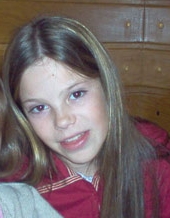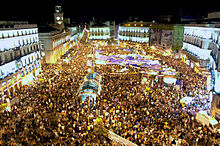Spain at the Beginning of 21st Century/Main events by year
Appearance
Below is a list of the main historical events in Spain, at each year of the period covered by this book.
2000
[edit | edit source]- As the rest of the world, Spain enters year 2000 with concerns about Y2K bug. In the end, nothing serious happened.
- On January 2, María de las Mercedes de Borbón y Orleans, mother of king Juan Carlos I, dies in Lanzarote (Canary Islands).
- Social psychosis over alleged ice chunks falling from the sky (incorrectly called aerolites by the media, that devoted a large part of the news coverage to this subject).[1]
- On March 12, the People's Party won an absolute majority in the general elections, thus renewing José María Aznar's mandate as prime minister for another four years.
- On July 22, José Luis Rodríguez Zapatero is elected Secretary General of the Spanish Socialist Workers' Party (PSOE), following the resignation of Joaquín Almunia after losing the general elections.
- On November 7, Spain closes the border to breeding cattle from France and Ireland due to mad cow disease. First cases in Spain are diagnosed before the end of the year.
2001
[edit | edit source]- Compulsory military service ends in Spain.
- On 13 May, elections are held in Basque Country autonomous community. PNV (Basque Nationalist Party) wins and Juan José Ibarretxe is reelected as lehendakari or Basque president.
- Spain is affected by the global crisis that followed the 9/11 terrorist attacks in New York City.
- First airing of the Spanish version of Star Academy, Operación Triunfo (meaning "Operation Triumph") talent show on TVE. This first edition brought to fame singers as David Bisbal, Chenoa, Rosa López or David Bustamante. David Bisbal later had a huge international success, while show winner Rosa López represented Spain at 2002 Eurovision Song Contest with the song Europe's Living a Celebration (the show was also used as the selection of Spain's representative at Eurovision Song Contest).
2002
[edit | edit source]
- On January 1, leaded gasoline is banned in Spain.
- On March 1, peseta ceases to be legal tender, and the euro becomes the only official currency in Spain (both the peseta and the euro had been legal tender since 1999, when euro was introduced).
- On April 5, Parque Warner Madrid theme park is inaugurated.
- On June 20, a general strike is called by UGT and CCOO trade unions.
- Between July 11 and July 20, a conflict develops between Spain and Morocco over Spanish Perejil island, taken over by Moroccan military. An agreement is reached with the mediation of the United States, and Moroccan troops leave the island.
- On November 19, Prestige oil tanker sinks off the Galician coast, causing an important ecological and political crisis.
2003
[edit | edit source]- Large protests against the participation of Aznar's government in the Iraq War launched by George Bush. On February 11, all oposition parties in parliament support a motion against the militaristic position of Bush and Aznar in the Iraq crisis.
- On May 3, Pope John Paul II visits Spain for fifth time. It would be his last visit to the country, before his death in 2005.
- On May 25, municipal elections are held. Regional elections are also held in some autonomous communities.
- On May 26, a Yakovlev Yak-42 plane carrying home 62 Spanish military personnel from Afghanistan crashes in Turkey. All 75 people on board died.
- On October 11, AVE high-speed train joins Madrid, Zaragoza and Lleida for the first time.
- On November 1, the wedding engagement between Felipe de Borbón (Prince of Asturias and heir to the Spanish throne) and journalist Letizia Ortiz is announced.
2004
[edit | edit source]
- On February 13, the electronic national identity card (DNI electrónico) is launched.
- On March 11, a jihadist terrorist attack against 4 trains in Madrid leaves 193 dead and about 2,000 injured. A political controversy over alleged ETA or Al Qaeda authorship followed over the following days. 7 terrorists who participated in the attacks would commit suicide on April 3 in Leganés, near Madrid, killing a policeman.
- On March 14, general elections are held, won by José Luis Rodríguez Zapatero of the Spanish Socialist Workers' Party (PSOE), who becomes prime minister or president of the government.
- On May 22, Prince of Asturias and heir to the Spanish throne, Felipe de Borbón, marries Letizia Ortiz in Madrid. He would become king 10 years later, as Felipe VI, following the abdication of his father, Juan Carlos I.
- On June 11, Un, dos, tres ("One, two, three") game show is aired for the last time in TVE. Its first broadcast had taken place in 1972, and it has been considered as one of the most important programs in the history of Spanish television. Its creator, Narciso Ibáñez Serrador, died in 2019.
- On November 20, Spanish 9-year-old María Isabel wins 2004 Junior Eurovision Song Contest, held in Lillehammer (Norway), with the song Antes muerta que sencilla ("Better dead than simple").
- On December 5, Davis Cup of tennis is won by Spain for the second time in history, with the final matches being played in Seville. A young Rafael Nadal became known to the general public. He would later win many Grand Slam tournaments, becoming one of the best tennis players in history.
2005
[edit | edit source]
- On February 12, in Madrid, Windsor Tower skyscraper is destroyed by fire at night. Despite the huge fire, there were no casualties.
- On February 20, a national referendum for the ratification of the European Constitution is held. 76.7 % of the voters approve the new Constitution, but the turnout was only 42 %.
- On July 3, same-sex marriage is legalized. Spain is the third country in the world to do so.
- On September 25, at Brazilian Grand Prix, Fernando Alonso becomes the first Spanish driver to win the Formula One World Championship. He would be world champion again the following year.
- On October 3, an annular solar eclipse is visible in Spain for the first time in 21st Century.
- On October 7, UME or Unidad Militar de Emergencias (emergency military unit) for disaster relief is created.
- On October 31, Leonor de Borbón, daughter of prince Felipe de Borbón and Letizia Ortiz, is born. She would become Princess of Asturias and heir to the Spanish crown with her father's accession to the throne in 2014.
- On December 15, the anti-smoking law that bans smoking in workplaces and some other places is passed.
2006
[edit | edit source]List of events to be added here
2007
[edit | edit source]List of events to be added here
2008
[edit | edit source]List of events to be added here
2009
[edit | edit source]List of events to be added here
2010
[edit | edit source]List of events to be added here
2011
[edit | edit source]
The historical period covered by this book comes to an end, but several important events occurred during this year:
- The anti-austerity protests of 15-M movement, began on 15 May, due to the economic crisis, in a context of many protests in other countries. They included a mass camping at Madrid's Puerta del Sol square.
- On 20 October, terrorist organization ETA, which seeked Basque Country's independence through armed struggle, announced the definitive cessation of its armed activity, putting an end to about 50 years of violence.
- On 20 November, general elections are held. The People's Party (PP) wins with an absolute majority, and Mariano Rajoy becomes prime minister (president of the government), replacing José Luis Rodríguez Zapatero from Spanish Socialist Workers' Party (PSOE).
This events can truly be said to mark the beginning of a new stage in Spain's history: a change of government, the end of ETA terrorism, and 15-M movement that would later give rise to the birth of new left-wing political parties. This new stage is clearly different from the 2000s decade in Spain.
References
[edit | edit source]- ↑ "20 AÑOS DE "AEROLITOS" EN ESPAÑA". Es Madrid no Madriz (in European Spanish). 2019-12-10. Retrieved 2024-09-22.
